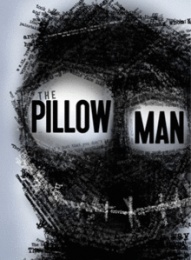Our book choice for April 2009 is The Pillowman by Martin McDonagh. The play is the viciously funny and seriously disturbing tale of a writer in an unnamed totalitarian state who is interrogated about the gruesome content of his short stories and their similarities to a number of child-murders occurring in his town.
The Pillowman is a 2003 play by British-Irish playwright Martin McDonagh. It tells the tale of Katurian Katurian, a fiction writer living in a police state, who is interrogated about the gruesome content of his short stories and their similarities to a number of bizarre child murders occurring in his town.
The play is set in an unnamed totalitarian state, where the authorities have a zero-tolerance policy for dissent. Katurian is arrested and brought in for questioning after a number of children are found murdered in ways that are eerily similar to the stories he has written.
The interrogators, Tupolski and Ariel, are initially convinced that Katurian is the killer, but he insists that he is innocent. He tells them that he has never harmed a child, and that his stories are simply works of fiction.
However, the interrogators are not convinced. They believe that Katurian’s stories are too realistic, and that they must have inspired the murders. They also point out that Katurian’s brother, Michal, has confessed to the murders, and that he claims that Katurian told him to do it.
Katurian denies everything, but the interrogators continue to press him. They torture him, both physically and mentally, in an attempt to get him to confess.
The Pillowman is a dark and disturbing play, but it is also a powerful and thought-provoking one. It explores the nature of art, the power of words, and the limits of freedom of expression. The play also raises questions about the nature of evil, and the responsibility of artists for the content of their work.
The play has been praised for its originality, its humor, and its suspense. It has also been criticized for its violence and its bleakness. However, there is no doubt that The Pillowman is a significant work of art, and it is sure to continue to be debated and discussed for many years to come.
Here are some additional thoughts on the play:
- The play explores the relationship between art and violence. Does art have the power to inspire violence? Or can it be a way of processing and understanding violence?
- The play also explores the role of the artist in society. What is the responsibility of the artist to the world? Can an artist be held responsible for the actions of others who are inspired by their work?
- The play is a meditation on the nature of evil. What is evil? Is it something that is inherent in human nature? Or is it something that is learned?
- The play is also a darkly funny work. McDonagh’s use of black humor helps to make the play more palatable, but it also serves to highlight the absurdity of the situation.
The Pillowman Discussion Questions
- Is there a limit to freedom of speech? Should art ever be censored?
- How does our past influence our present?
- What is the role of police in society? Of the artist? Are they mutually exclusive?
- Do violent acts exist in a vacuum? Or are they irretrievably connected to the world around them?
- Consider Katurian’s stories. What messages to they send? Both positive and negative?
- In what ways are Tupolski and Ariel “good guys”? In what ways are they “bad guys”?
- Is Katurian completely sympathetic? In what ways? In what ways not?
- Is Michael wholly responsible for his actions alone?
- Are Katurian’s priorities correct in your opinion?
- Is Katurian wholly responsible for the events of the story?
- What does “The Pillowman” say about the responsibility of artists for perpetuating violence?
- What does “The Pillowman” say about freedom of speech or intellectual freedom?
- What does “The Pillowman” say about how society treats and reacts to violence?

